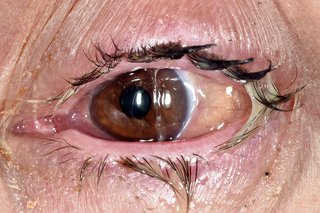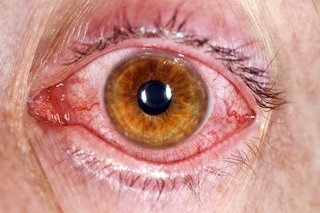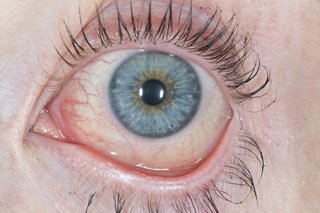Conjunctivitis
Conjunctivitis
Conjunctivitis is an eye condition caused by infection or allergies. It usually gets better in a couple of weeks without treatment.
Check if you have conjunctivitis
Conjunctivitis is also known as red or pink eye.
It usually affects both eyes and makes them:
- bloodshot
- burn or feel gritty
- produce pus that sticks to lashes
- itch
- water



If you're not sure it's conjunctivitis
Other conditions can cause red eyes.
How to treat conjunctivitis yourself
There are things you can do to help ease your symptoms.
Use clean cotton wool (1 piece for each eye). Boil water and then let it cool down before you:
- gently rub your eyelashes to clean off crusts
- hold a cold flannel on your eyes for a few minutes to cool them down
Do not wear contact lenses until your eyes are better.
What Causes Pink Eye?
Conjunctivitis is often called pink eye. It happens when the conjunctiva is irritated by an infection or allergies. Your eyes are red and swollen (inflamed), and sometimes they have a sticky discharge. You can have conjunctivitis in one or both eyes. Some types of pink eye are very contagious (easily spread from person to person).
There Are Three Main Types of Conjunctivitis
Viral conjunctivitis
Viral conjunctivitis is the most common type of pink eye. This conjunctivitis is very contagious and often spreads through schools and other crowded places. It usually causes burning, red eyes with a watery discharge.
Bacterial conjunctivitis
Bacterial conjunctivitis is also very contagious. An infection from bacteria causes this form of pink eye. With bacterial conjunctivitis, you have sore, red eyes with a lot of sticky pus.
Allergic conjunctivitis
Allergic conjunctivitis is a type of pink eye that comes from an allergic reaction to something. It is not contagious. Allergic pink eye makes your eyes very itchy, red and watery, and the eyelids may get puffy.
How Do You Get Pink Eye?
Viral conjunctivitis
Conjunctivitis is most commonly caused by the same virus that causes the runny nose and sore throat of the common cold.
Bacterial conjunctivitis
Bacterial infections cause conjunctivitis that produces lots of sticky pus in the eye. Some bacterial infections, however, may cause little or no discharge. Sometimes the bacteria that cause pink eye are the same that cause strep throat. Both bacterial and viral conjunctivitis are easily spread from person to person.
Bacterial and viral conjunctivitis can be quite contagious. The most common ways to get the contagious form of pink eye include:
- Direct contact with an infected person's bodily fluids, usually through hand-to-eye contact.
- Spread of the infection from bacteria living in the person's own nose and sinuses.
- Not cleaning contact lenses properly. Using poorly fitting contact lenses or decorative contacts are risks as well.
Children are the people most likely to get pink eye from bacteria or viruses. This is because they are in close contact with so many others in school or day care centers. Also, they don't practice good hygiene.
Allergic conjunctivitis
Sometimes having an allergic reaction to pollen or animals can cause conjunctivitis. The irritation can also come from cigarette smoke, car fumes, pool chlorine or other toxic substances. The main symptom of allergic pink eye is itchy eyes. Other symptoms include red, burning and tearing eyes and puffy eyelids. Allergic conjunctivitis is not contagious.
Pink Eye Symptoms
Your pink eye symptoms may include:
- the feeling that something is in your eye, or a gritty sensation in your eye
- red eyes
- burning eyes
- itchy eyes
- painful eyes (this is usually with the bacterial form)
- watery eyes
- puffy eyelids
- blurry or hazy vision
- being extra sensitive to light
- lots of mucus, pus, or thick yellow discharge from your eye. There can be so much that your eyelashes stick together (usually with bacterial conjunctivitis).
Pink Eye Treatment
Treating your pink eye usually depends on the type of conjunctivitis you have.
If your conjunctivitis is caused by a viral infection, there are no specific treatments. Your body fights the virus on its own. Placing a cool, wet washcloth on your eyes can help make them feel more comfortable.
If your pink eye is caused by a bacterial infection, your ophthalmologist may prescribe antibiotic eye drops, depending on how severe your symptoms are. Antibiotics do not treat an infection caused by a virus or by allergy.
If your conjunctivitis is due to allergies, you might be told to use certain eye drops to help with the itchiness and puffiness.
Sometimes conjunctivitis can be caused by a chemical or other substance in your eye. In this case, rinse the eye free of the substance. You might be told to use certain eye drops or ointment for the eyes.
Stop Pink Eye From Spreading
Some conjunctivitis can spread from person to person. Follow these tips so you will not infect other people or re-infect yourself.
- Use a clean towel or tissue each time you wipe your face and eyes.
- Wash your hands very often. Always wash them before and after you eat, when you go to the bathroom, or after you sneeze or cough.
- Try not to touch your eyes. If you do, wash your hands right away.
- Bacteria can live in makeup. This can cause pink eye and even a dangerous infection of the cornea. Do not use eye makeup while your eyes are infected. Replace your makeup if you have an eye infection. And never share eye makeup with others.
- Make sure to clean your contact lenses exactly as your ophthalmologist recommends.
Conjunctivitis usually goes away on its own within 1–2 weeks. If your symptoms last longer than that, you should see your ophthalmologist. He or she can make sure you don't have a more serious eye problem.
- Complication of Conjunctivitis
- Conjunctivitis
- Conjunctivitis myths
- Diagnosis of Conjunctivitis
- How is Conjunctivitis treated?
- Medicine for Conjunctivitis
- Remedies for Conjunctivitis
- Support for Conjunctivitis
- Symptoms associated with Conjunctivitis
- The best British Online Pharmacy
- Top 10 UK Pharmacies
- Treatment for Conjunctivitis
- What causes Conjunctivitis
- What is Conjunctivitis
- Where can I buy medicine for Conjunctivitis in the UK
- ZimSeller Pharmacy



















